英语部分
英语成分

6.不定式是英语动词的一种形式。它在许多情况下可省略"to"它不同于汉语动词,汉语动词只有一种形式。如:我看书。她看书。但英语要说“看”必须根据主语的人称,动作发生的时间等确定其形式。如:1)I read a book. 2)She reads a book.1)句中的“read”
I'm interested in handwriting.我对书法很感兴趣。(作介词宾语)
④补语:说明宾语、主语“做什么”或“处于某种状态”。常由名词、形容词等词类来担任。如:
The teacher named me Lucy.老师叫我露茜。(名词作补语)
Very loud noises can make people ill.非常大的噪音会让人得病。(形容词作补语)
①主语:用于说明人或事物执行某一动作,表明“谁”或“什么”。常由名词、代词和数词来担任。如:
I love the book.The book is my friend.我喜欢这本书。这本书是我的朋友。(名词作主语)
②谓语:说明主语的动作或状态,表明“做什么”或“是什么”。常由实义动词或系动词加上表语部分来充当。如:
It is a pity (表语)thatNancy cannot come to the party.
令人遗憾的是兰西不能;来参加宴会了.
The new (主语)is(连系动词) ture(表语).那消息是真的.
常用系动词用法比较
形容词在这类系动词后面作表语
go和come相比,“go+形容词”多表示“从好的状态变成坏的状态”,后面的形容词为mad, crazy, blind, lame或表示颜色的形容词,go前面的主语一般为人
英语主要部分的作文
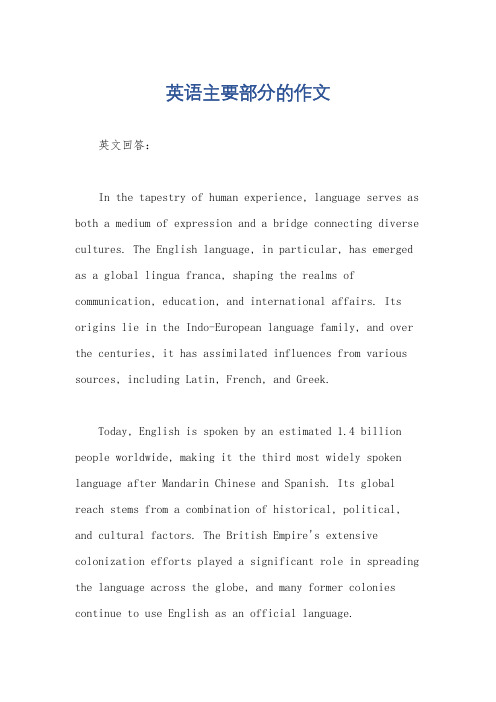
英语主要部分的作文英文回答:In the tapestry of human experience, language serves as both a medium of expression and a bridge connecting diverse cultures. The English language, in particular, has emerged as a global lingua franca, shaping the realms of communication, education, and international affairs. Its origins lie in the Indo-European language family, and over the centuries, it has assimilated influences from various sources, including Latin, French, and Greek.Today, English is spoken by an estimated 1.4 billion people worldwide, making it the third most widely spoken language after Mandarin Chinese and Spanish. Its global reach stems from a combination of historical, political, and cultural factors. The British Empire's extensive colonization efforts played a significant role in spreading the language across the globe, and many former colonies continue to use English as an official language.The dominance of the United States as a global superpower further solidified English's position as a language of international communication. In the realms of business, diplomacy, and academia, English has become the preferred medium of exchange, facilitating cross-cultural interactions and the sharing of knowledge.Beyond its practical utility, English has also had a profound impact on global culture. It has become the language of literature, music, and entertainment, allowing masterpieces from different parts of the world to transcend linguistic barriers and reach a wider audience. English-language novels, films, and songs have shaped globalartistic sensibilities and fostered cultural exchange.Furthermore, English has played a pivotal role in the advancement of science and technology. Many groundbreaking discoveries and innovations have been communicated and disseminated in English, contributing to the progress of human knowledge and shaping the modern world. From the theories of Newton and Einstein to the latest advancementsin computing and medicine, English has served as the language of scientific discourse, enabling collaborationand the exchange of ideas across borders.In conclusion, the English language has emerged as a global phenomenon, transcending its humble origins to become a powerful force in communication, education, international affairs, and cultural exchange. Its widespread adoption has not only fostered globalconnectivity but also facilitated the dissemination of knowledge, the appreciation of artistic expression, and the advancement of human progress.中文回答:英语语言作为人类经验中的主要部分,既是表达的媒介,也是连接不同文化的桥梁。
部分用英语怎么说

部分用英语怎么说部分一般指整体中的局部;整体里的一些个体。
如:她给了他许多钞票,都是十元一张的,有一部分是客人给她的。
那么你知道部分用英语怎么说吗?下面来学习一下吧。
部分英语说法1section部分英语说法2portion部分英语说法3part部分的英语例句:我的部分工作是同我们的供应商保持良好的关系。
Part of my job is to maintain good relationship with our suppliers.你可以在这本书的第一部分找到你要的资料。
You may find the information you need in the first portion of the book.这家公司控制了这一部分市场。
The company dominates this segment of the market.我们都必须负一部分责任。
We are all partly to blame.抵押款提高了,其中一部分可由免税额增加而抵消。
Higher mortgage rates are partly offset by increased tax allowances.最后一部分总结了双方的全部论点。
The last section sums up all the arguments on either side.一控制部分控制该存储部分和该显示部分。
A control part controls the storing part and the display part.弯曲部分,有钩部分曲线形或长倒刺的动植物部分A curved or barbed plant or animal part.两部分的两部分的或由两部分构成的Having or consisting of two parts.在这个部分,我们将对4种可行的广义方法进行对比。
In this section we contrast four possible broad approaches.阻止后者通过未接合部分出来。
综合英语5高级英语1部分课文翻译
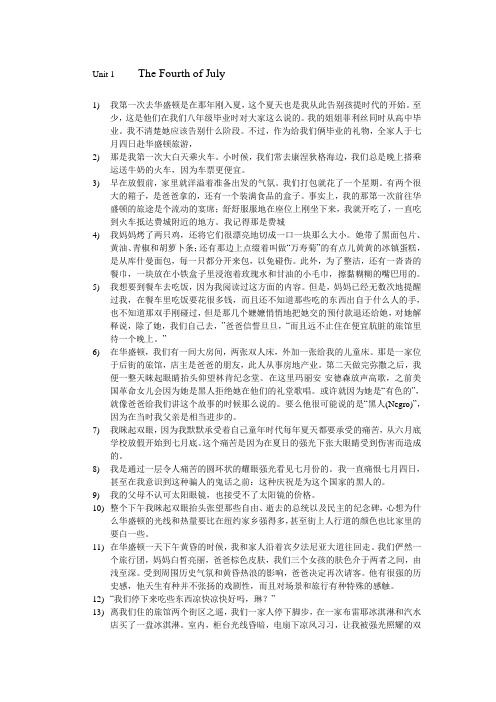
Unit 1 The Fourth of July1)我第一次去华盛顿是在那年刚入夏,这个夏天也是我从此告别孩提时代的开始。
至少,这是他们在我们八年级毕业时对大家这么说的。
我的姐姐菲利丝同时从高中毕业。
我不清楚她应该告别什么阶段。
不过,作为给我们俩毕业的礼物,全家人于七月四日赴华盛顿旅游,2)那是我第一次大白天乘火车。
小时候,我们常去康涅狄格海边,我们总是晚上搭乘运送牛奶的火车,因为车票更便宜。
3)早在放假前,家里就洋溢着准备出发的气氛。
我们打包就花了一个星期。
有两个很大的箱子,是爸爸拿的,还有一个装满食品的盒子。
事实上,我的那第一次前往华盛顿的旅途是个流动的宴席;舒舒服服地在座位上刚坐下来,我就开吃了,一直吃到火车抵达费城附近的地方。
我记得那是费城4)我妈妈烤了两只鸡,还将它们很漂亮地切成一口一块那么大小。
她带了黑面包片、黄油、青椒和胡萝卜条;还有那边上点缀着叫做“万寿菊”的有点儿黄黄的冰镇蛋糕,是从库什曼面包,每一只都分开来包,以免碰伤。
此外,为了整洁,还有一沓沓的餐巾,一块放在小铁盒子里浸泡着玫瑰水和甘油的小毛巾,擦黏糊糊的嘴巴用的。
5)我想要到餐车去吃饭,因为我阅读过这方面的内容。
但是,妈妈已经无数次地提醒过我,在餐车里吃饭要花很多钱,而且还不知道那些吃的东西出自于什么人的手,也不知道那双手刚碰过,但是那几个嬷嬷悄悄地把她交的预付款退还给她,对她解释说,除了她,我们自己去,”爸爸信誓旦旦,“而且远不止住在便宜肮脏的旅馆里待一个晚上。
”6)在华盛顿,我们有一间大房间,两张双人床,外加一张给我的儿童床。
那是一家位于后街的旅馆,店主是爸爸的朋友,此人从事房地产业。
第二天做完弥撒之后,我便一整天眯起眼睛抬头仰望林肯纪念堂。
在这里玛丽安·安德森放声高歌,之前美国革命女儿会因为她是黑人拒绝她在他们的礼堂歌唱。
或许就因为她是“有色的”,就像爸爸给我们讲这个故事的时候那么说的。
要么他很可能说的是“黑人(Negro)”,因为在当时我父亲是相当进步的。
英语 部分单词用法区别
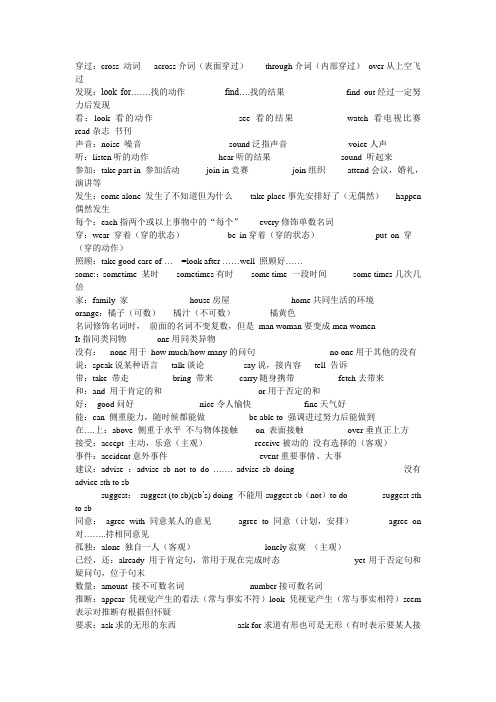
穿过:cross 动词across介词(表面穿过)through介词(内部穿过)over从上空飞过发现:look for…….找的动作find….找的结果find out经过一定努力后发现看:look看的动作see看的结果watch看电视比赛read杂志书刊声音:noise 噪音sound泛指声音voice人声听:listen听的动作hear听的结果sound 听起来参加:take part in 参加活动join in竞赛join组织attend会议,婚礼,演讲等发生:come alone 发生了不知道但为什么take place事先安排好了(无偶然)happen 偶然发生每个:each指两个或以上事物中的“每个”every修饰单数名词穿:wear 穿着(穿的状态)be in穿着(穿的状态)put on 穿---(穿的动作)照顾:take good care of …=look after ……well 照顾好……some::sometime 某时sometimes有时some time 一段时间some times几次几倍家:family 家house房屋home共同生活的环境orange:橘子(可数)橘汁(不可数)橘黄色名词修饰名词时,前面的名词不变复数,但是man woman要变成men womenIt指同类同物one用同类异物没有:none用于how much/how many的问句no one用于其他的没有说:speak说某种语言talk谈论say说,接内容tell 告诉带:take 带走bring 带来carry随身携带fetch去带来和:and 用于肯定的和or用于否定的和好:good问好nice令人愉快fine天气好能:can 侧重能力,随时候都能做be able to 强调进过努力后能做到在….上:above 侧重于水平不与物体接触on 表面接触over垂直正上方接受:accept 主动,乐意(主观)receive被动的没有选择的(客观)事件:accident意外事件event重要事情、大事建议:advise :advise sb not to do ……. advise sb doing 没有advice sth to sbsuggest:suggest (to sb)(sb’s) doing 不能用suggest sb(not)to do suggest sth to sb同意:agree with同意某人的意见agree to 同意(计划,安排)agree on 对……..持相同意见孤独:alone 独自一人(客观)lonely寂寞(主观)已经,还:already 用于肯定句,常用于现在完成时态yet用于否定句和疑问句,位于句末数量:amount 接不可数名词number接可数名词推断:appear凭视觉产生的看法(常与事实不符)look 凭视觉产生(常与事实相符)seem 表示对推断有根据但怀疑要求:ask求的无形的东西ask for求道有形也可是无形(有时表示要某人接电话)打:beat有目的地在某物上连续不断的打hit强调击中strike用力打突然打开始:①非正式文体中,start比begin常用②start用于动作,begin用于缓慢的开始③begin 用于时间开始尽力:do one’s best不一定不成功try one’s best 尽力但没成功之意大:big用于口语化,多指体积、重量、规模、程度方面的large 指宽度、数量大原因:cause 造成一种事的直接原因常与of连用reason推理上的里有负责:in charge of主语是人of后面加物in the charge of主语是事物of后面加人正确:correct没有缺点或错误侧重精确性right意志,道德,事实一致死:die of 患……….而死die from 死于病或情感意外的(饥饿,寒冷)快:fast 动作迅速quick即刻行动rapid流速等旅游:journey距离较远的单程旅行trip短距离旅行travel旅行,游历,时间较长的旅行靠近:near没有静靠close紧靠和近在身边关系亲切问题:problem通常指等待解决或决定的问题,比较困难的question 对某事疑惑不接,提出问题等待回答修补:repair修理较复杂的损伤较大的东西(汽车等)mend结构简单的小东西适合:suit侧重于颜色、款式fit侧重于尺寸、大小in bed 人在床上in the bed物品在床上the +(修饰人)形容词表示那类人复数the+ 姓氏s 表………一家复数the+国际形容词哪国人复数时间,重量,数目,价格,长度作主语三单“more than noe(不止一个)many a………(许多)”作主语三单“名词+with/as well as….”做主语与名词单复数一致one or two +名词复数one +名词or two 三单。
英语课文背诵部分
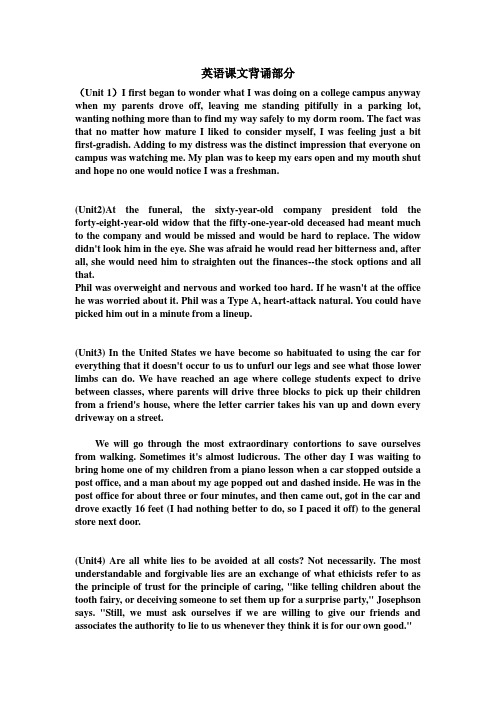
英语课文背诵部分(Unit 1)I first began to wonder what I was doing on a college campus anyway when my parents drove off, leaving me standing pitifully in a parking lot, wanting nothing more than to find my way safely to my dorm room. The fact was that no matter how mature I liked to consider myself, I was feeling just a bit first-gradish. Adding to my distress was the distinct impression that everyone on campus was watching me. My plan was to keep my ears open and my mouth shut and hope no one would notice I was a freshman.(Unit2)At the funeral, the sixty-year-old company president told the forty-eight-year-old widow that the fifty-one-year-old deceased had meant much to the company and would be missed and would be hard to replace. The widow didn't look him in the eye. She was afraid he would read her bitterness and, after all, she would need him to straighten out the finances--the stock options and all that.Phil was overweight and nervous and worked too hard. If he wasn't at the office he was worried about it. Phil was a Type A, heart-attack natural. You could have picked him out in a minute from a lineup.(Unit3) In the United States we have become so habituated to using the car for everything that it doesn't occur to us to unfurl our legs and see what those lower limbs can do. We have reached an age where college students expect to drive between classes, where parents will drive three blocks to pick up their children from a friend's house, where the letter carrier takes his van up and down every driveway on a street.We will go through the most extraordinary contortions to save ourselves from walking. Sometimes it's almost ludicrous. The other day I was waiting to bring home one of my children from a piano lesson when a car stopped outside a post office, and a man about my age popped out and dashed inside. He was in the post office for about three or four minutes, and then came out, got in the car and drove exactly 16 feet (I had nothing better to do, so I paced it off) to the general store next door.(Unit4) Are all white lies to be avoided at all costs? Not necessarily. The most understandable and forgivable lies are an exchange of what ethicists refer to as the principle of trust for the principle of caring, "like telling children about the tooth fairy, or deceiving someone to set them up for a surprise party," Josephson says. "Still, we must ask ourselves if we are willing to give our friends and associates the authority to lie to us whenever they think it is for our own good."(Unit8)I think the essence of wisdom is emancipation, as fat as possible, from the tyranny of the here and now. We cannot help the egoism of our senses. Sight and sound and touch are bound up with our own bodies and cannot be impersonal. Our emotions start similarly from ourselves. An infant feels hunger or discomfort, and is unaffected except by his own physical condition. Gradually with the years, his horizon widens, and, in proportion as his thoughts and feelings become less personal and less concerned with his own physical states, he achieves growing wisdom. This is of course a matter of degree. No one can view the world with complete impartiality; and if anyone could, he would hardly be able to remain alive. But it is possible to make a continual approach towards impartiality, on the one hand, by knowing things somewhat remote in time or space, and on the other hand, by giving to such things their due weight in our feelings. It is this approach towardsimpartiality that constitutes growth in wisdom.(Unit9)The preparation is detailed, and the enjoyment must therefore match it. Thus, a proper Chinese meal can four hours and proceed almost like a religious ceremony. It is a shared experience for the participants, not a lonely chore, with its procession of planned and carefully contrived dishes, some elements designed to blend, others to contrast. Meat and fish, solids and soups, sweet and sour sauces, crisp and smooth textures, fresh and dried vegetables-all of these and more challenge the palate with their appropriate charms.。
英语专业翻译部分
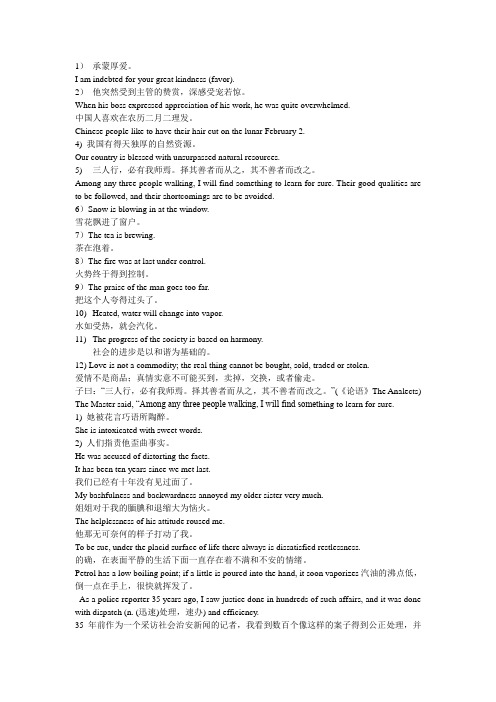
1)承蒙厚爱。
I am indebted for your great kindness (favor).2)他突然受到主管的赞赏,深感受宠若惊。
When his boss expressed appreciation of his work, he was quite overwhelmed.中国人喜欢在农历二月二理发。
Chinese people like to have their hair cut on the lunar February 2.4) 我国有得天独厚的自然资源。
Our country is blessed with unsurpassed natural resources.5) 三人行,必有我师焉。
择其善者而从之,其不善者而改之。
Among any three people walking, I will find something to learn for sure. Their good qualities are to be followed, and their shortcomings are to be avoided.6)Snow is blowing in at the window.雪花飘进了窗户。
7)The tea is brewing.茶在泡着。
8)The fire was at last under control.火势终于得到控制。
9)The praise of the man goes too far.把这个人夸得过头了。
10) Heated, water will change into vapor.水如受热,就会汽化。
11) The progress of the society is based on harmony.社会的进步是以和谐为基础的。
12) Love is not a commodity; the real thing cannot be bought, sold, traded or stolen.爱情不是商品;真情实意不可能买到,卖掉,交换,或者偷走。
英语单词L部分

lag [læɡ] n. 落后;迟延;防护套;囚犯;桶板vt. 落后于;押往监狱;加上外套vi. 滞后;缓缓而行;蹒跚adj. 最后的landscape ['lændskeip] n.风景,景致;山水画vt. 美化…景观vi. 从事景观美化工作lane[lein] n.小路,胡同,小巷,里弄,行车道;[篮球]罚球区lantern ['læntən] n.灯,灯笼;灯笼式天窗lapse[læps] n.失足,失效;流逝;过失vi. 失效;流逝;背离,失检;陷入Two weeks have lapsed since they arrived in Paris.自他们抵达巴黎以来,已过去了两个星期了。
latent ['leitənt] a.潜在的,潜伏的,不易察觉的lateral['lætərəl] n.侧部;边音adj.侧面的,旁边的latitude ['lætitju:d]n.纬度longitude['lɔndʒitju:d, -tu:d] n.经度liberal ['libərəl]a.慷慨的,大方的;富足的;自由的,思想开朗的;不拘泥的;宽大的n. 自由主义者lid [lid] n.盖,盖子;眼睑;限制vt. 给…盖盖子limb[lim] n.肢,翼,大树枝,臂;分支;枝干vt. 切断…的手足;从…上截下树枝lime[laim] n.石灰limp[limp] a.柔软的,易曲的v./n.蹒跚,跛行liner ['lainə]n.班机,班轮;衬垫;画线者linger['liŋɡə] v.逗留,徘徊,拖延liquor ['likə]n.酒,烈性酒literacy ['litərəsi] n.有文化,识字;读写能力;教养2. 擅长写作literally['litərəli] ad.照字面意义,逐字地;确实literary ['litərəri]a.文学上的,文学的;精通文学的,从事写作的;书面的n.[美国英语]文学俱乐部literature['litərətʃə] n.文学,文学作品,文献;著作litter['litə] n.废物vi.乱扔vt.乱扔杂物launch[lɔ:ntʃ, lɑ:ntʃ] v.发射;使(船)下水,发动,开展n.发射,下水laundry['lɔ:ndri, 'lɑ:n-] n.洗衣房(店);待洗衣物,所洗衣物lavatory['lævətəri, -,tɔ:ri] n.厕所,盥洗室layout n.布局,陈设;陈列;;安排leap[li:p] v.跳,跳跃n.跳跃,飞跃vt. 跳跃,跳过;使跃过[ 过去式leaped或leapt 过去分词leaped或leapt 现在分词leaping ]lease [li:s]vt vi.出租, 租得n.租约,租契leasehold ['li:shəuld]a. 借贷的,租赁的n.1. 租借;租得2. 租赁权3. 租得的土地、房屋等4. 出租土地所得的利润leaseholder['li:shəuldə] n. 租地人,租借人,租赁人,承租人,leaser [li:sə]分纱机;出租人legacy ['leɡəsi]n. 遗产,遗留之物legend['ledʒənd] n.传说,传奇,传奇人物,[口语]香饽饽(特受欢迎的人) lens[lenz] n. (凹或凸)透镜;镜片2. 【摄影术】(照相机等的)镜头3.【解剖学】(眼球的)晶状体;(昆虫复眼的)晶体( =crystalline adj. 透明的;水晶般的;水晶制的['kristəlain] lens)lessen ['lesən] v.减少,减轻,使缩小,使减轻to lessen production costs降低生产成本to lessen the tension['tenʃən]减少压力2. [古语]轻视,藐视;贬低;抹杀:例句: to lessen a person's feat抹杀某人的功绩vi.减少;变小;缩小;减轻:例句: The difference between the city and the countryside lessens gradually.城乡差别逐渐缩小lest [lest]conj.惟恐,免得He got up early that morning lest he shouldmiss the train.他那天早上起得很早,生怕误了火车。
构成英语单词的三个部分

构成英语单词的三个部分一、词根(Root)1. 定义。
- 词根是单词的核心部分,它包含着单词的基本意义。
一个词根可以单独构成一个单词(如:act [ækt],v. 行动),也可以和前缀、后缀组合成新的单词。
2. 举例。
- vis(看)- visible ['vɪzəbl],adj. 看得见的(vis + ible,ible是形容词后缀,表示“可……的”)- port(拿,运)- import [ɪm'pɔːt],v. 进口(im - 是前缀,表示“进入”,port是词根,合起来表示“运进来”)二、前缀(Prefix)1. 定义。
- 前缀是加在词根前面的部分,它可以改变单词的意义。
2. 常见前缀及举例(含音标、词性)- un -(不)- unhappy [ʌn'hæpi],adj. 不快乐的(un - + happy,happy [ˈhæpi],adj. 快乐的)- re -(再,重新)- rewrite [riː'raɪt],v. 重写(re - + write [raɪt],v. 写)三、后缀(Suffix)1. 定义。
- 后缀是加在词根后面的部分,它可以改变单词的词性,有时也会改变单词的意义。
2. 常见后缀及举例(含音标、词性)- -er(表示人或物)- teacher ['tiːtʃə(r)],n. 教师(teach [tiːtʃ],v. 教+ -er)- -ful(充满……的,形容词后缀)- beautiful ['bjuːtɪfl],adj. 美丽的(beauty ['bjuːti],n. 美丽+ -ful)。
英语单词F部分

gradual ['ɡrædʒuəl]a.逐渐的,逐步的graft [ɡrɑ:ft, ɡræft]v. 嫁接,移植,n. 贪污 grammatical [ɡrə'mætikəl] a.语法的grant[ɡrɑ:nt, ɡrænt] v.同意,准予;给予,授予n.授予物grant-in-aid ['ɡrɑ:ntin'eid]n. 补助金,赠与款graph[ɡrɑ:f, ɡræf] n.图表,曲线图graphic['ɡræfik] adj.图表的,生动的grasp[ɡrɑ:sp, ɡræsp] v./n.抓住,抓紧;掌握,领会gratitude['ɡrætitju:d] n.感激,感谢grave [ɡreiv]n.坟墓a.严肃的,庄重的gravity ['ɡræviti]n.重力,引力;严肃,庄重grease [ɡri:s]n.动物脂,油脂,润滑脂v.抹油,润滑greedy [ɡri:di]a.贪吃的,贪婪的,渴望的greenback['ɡri:nbæk] n. 美钞,背部为绿色之动物greet [ɡri:t] v.致敬,敬意,迎接;扑(鼻),入(耳),触(目) grief [ɡri:f]n.悲哀,悲痛grieve[ɡri:v] v.使悲伤,使伤心grim [ɡrim] a.冷酷无情的,严厉的grin[ɡrin] vi.咧着嘴笑grind[ɡraind] v.磨(碎),碾(碎)grip[ɡrip] v./n.紧握,抓紧groan[ɡrəun] v./n.呻吟grocer ['ɡrəusə] n.食品商,杂货商grocery['ɡrəusəri] n.杂货店,杂货grope [ɡrəup]vi.(暗中)摸索,探索gross[ɡrəus] a.总的,毛(重)的;粗鲁的,粗俗的n.总额guarantee[,ɡærən'ti:] n.保证,保证书v.保证,担保germ [dʒə:m]n.微生物,细菌gesture['dʒestʃə] n.姿势,姿态,手势v.做手势giant['dʒaiənt] n.巨人a.巨大的gigantic[,dʒai'ɡæntik] a.巨大的,庞大的giggle ['ɡiɡl]v.哈哈地笑giroback n.转帐支票glamour['ɡlæmə] n.魅力,魔力glance [ɡlɑ:ns, ɡlæns]v.(at,over)扫视n.匆匆看,一瞥,一眼glare[ɡlεə] n./v.始祖,瞪眼v./n.闪耀,闪光glide[ɡlaid] n./v.溜,滑行glimpse[ɡlimps] n./v.一瞥,瞥见glitter['ɡlitə] n.光辉,灿烂v.闪耀global['ɡləubəl] a.全球的,世界的globe[ɡləub] n.球体,地球仪;地球,世界gloomy ['ɡlu:mi] a.阴暗的,阴沉的glorious['ɡlɔ:riəs] a.壮丽的,辉煌的;光荣的glory['ɡlɔ:ri] n.光荣,荣誉glove[ɡlʌv] n.手套glow[ɡləu] v.发热,发光,发红n.白热glue [ɡlu:] n.胶,胶水v.胶合,粘贴glut [ɡlʌt]n./v. 供过于求,过多go v.去,离去;放置,装入;运转;变为,成为n.围棋goodness ['ɡudnis]n.善良,仁慈;美德int.天哪goodwill ['ɡud'wil] n.善意,好意goose[ɡu:s] n.((pl.)geese[gi:s])鹅gossip ['ɡɔsip]n.流言蜚语v.传播流言蜚语;说长道短govern['ɡʌvən] v.统治,管理;决定,支配governor['ɡʌvənə] n.总督,州(省)长gown [ɡaun] n.长袍,法衣,礼服,睡袍grab [ɡræb]v./n.(at)抓(住);夺(得)grace [ɡreis]n.优美,文雅;恩惠,恩泽graceful['ɡreisful] a.优美的,文雅的grade [ɡreid] n.等级,级别;年级;分数v.分等,分级:gain [ɡein]v.获得,博得;增加,(钟,表)走快n.收益,得益galaxy['ɡæləksi] n.星系;(the Galaxy)银河(系) gallery['ɡæləri] n.长廊,画廊,美术馆gallon['ɡælən] n.加仑gamble['ɡæmbl]n./v.投机,冒险;赌博gang [ɡæŋ]n.一帮,一群,一伙gap[ɡæp] n.间隙,缺口garage ['ɡærɑ:dʒ, ɡə'r-] n.车库,飞机库;修车厂garbage ['ɡɑ:bidʒ] n.垃圾gardener['ɡɑ:dənə] n.园丁,花匠garment['ɡɑ:mənt] n.(一件)衣服gasoline ['ɡæsəli:n]n.汽油gasp[ɡɑ:sp, ɡæsp] n.喘息,气喘v.喘息;气吁吁地说gay[ɡei] a.艳丽的;放荡的.快乐的,愉快的n.同性恋gaze[ɡeiz] v./n.凝视,注视gear [ɡiə]n.齿轮,传动装置v.(to)调整,使适合gene[dʒi:n] n.基因generalize ['dʒenərəlaiz] v.归纳,概括;推广,普及generator['dʒenəreitə] n.发电机,发生器generous['dʒenərəs] a.宽宏大量的,慷慨的genetic[dʒi'netik] a.遗传的,起源的genius['dʒi:njəs] n.天才,天赋;精神gentle['dʒentl] a.和蔼的,文雅的,有礼貌的gentleman['dʒentlmən] n.绅士,先生gently ['dʒentli]ad.文雅地,有礼貌地;轻轻地genuine['dʒenjuin] a.真正的,名副其实的geography[dʒi'ɔɡrəfi] n. 地理;地形geographic[,dʒiə'græfik] a.地理(学)的geology[dʒi'ɔlədʒi] n.地质(学)geometry[dʒi'ɔmitri] n.几何(学)guidance['ɡaidəns] n.引导,指导guilt[ɡilt] n.罪过,内疚guilty ['ɡilti] a.(of)有罪的,内疚的guitar[ɡi'tɑ:] n. 吉他,六弦琴gulf[ɡʌlf] n.海湾gum [ɡʌm]n.树胶;口香糖gymnasium[dʒim'neiziəm] n.体育馆,健身房。
高级英语课后翻译部分

NUIT1(1)The one I am thinking of particularly is entered by a Gothic - arched gateway of aged brick and s tone. You pass from the heat and glare of a big, open square into a cool, darkcavern which extends as far as the eye can see, losing itself in the shadowy distance. 其入口处是一座古老的砖石结构的哥特式拱门。
你首先要穿过一个赤日耀眼、灼热逼人的大型露天广场,然后走进一个凉爽、然后走进一个凉爽、幽暗的洞穴。
这市场一直向前延伸,幽暗的洞穴。
这市场一直向前延伸,幽暗的洞穴。
这市场一直向前延伸,一眼望不到尽头,一眼望不到尽头,一眼望不到尽头,消失在远处的阴消失在远处的阴影里。
影里。
(2)It is a point of honor with the customer not to let the shopkeeper guess what it is she really likesand wants until the last moment. 对于顾客来说,至关重要的一点是,不到最后一刻是不能让店主猜到她心里究竟中意哪样东西、想买哪样东西的。
店主猜到她心里究竟中意哪样东西、想买哪样东西的。
(3)The seller, on the other hand, makes a point of protesting that the price he is charging is depriving him of all profit , and that he is sacrificing this because of his personalregard for the customer. 而在卖主那一方来说,他必须竭尽全力地声称,他开出的价钱使他根本无利可图,而他之所以愿意这样做完全是出于他本人对顾客的敬重。
英语单词M部分
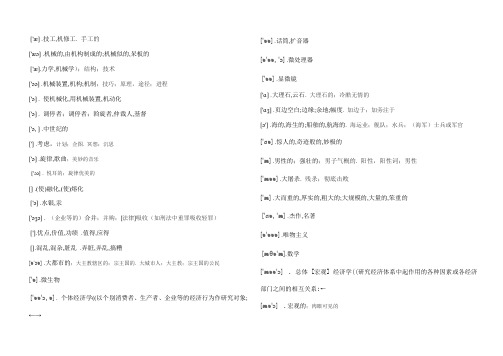
['æ] .技工,机修工. 手工的['æə] .机械的,由机构制成的;机械似的,呆板的['æ].力学,机械学);结构;技术['əə] .机械装置,机构;机制;技巧;原理,途径;进程['ə] . 使机械化,用机械装置,机动化['ə] . 调停者;调停者;斡旋者,仲裁人,基督['ə, ] .中世纪的['] .考虑,计划;企图. 冥想;沉思['ə] .旋律,歌曲;美妙的音乐['əə] . 悦耳的;旋律优美的[] .(使)融化,(使)熔化['ə] .水银,汞['əʒə] .(企业等的)合并;并购;[法律]吸收(如刑法中重罪吸收轻罪)['].优点,价值,功绩.值得,应得[].混乱,混杂,脏乱 .弄脏,弄乱,搞糟[ə'ɔə] .大都市的;大主教辖区的;宗主国的. 大城市人;大主教;宗主国的公民['ə] .微生物['əə'ɔ, ə] . 个体经济学((以个别消费者、生产者、企业等的经济行为作研究对象; ←→ ['əə] .话筒,扩音器[ə'əə, 'ɔ] .微处理器['əə] .显微镜['ɑ] .大理石,云石. 大理石的;冷酷无情的['ɑʒ] .页边空白;边缘;余地;幅度. 加边于;加旁注于[ə'] .海的,海生的;船舶的,航海的. 海运业;舰队;水兵;(海军)士兵或军官['ɑə] .惊人的,奇迹般的,妙极的['æ] .男性的;强壮的;男子气概的. 阳性,阳性词;男性['æəə] .大屠杀. 残杀;彻底击败['æ] .大而重的,厚实的,粗大的;大规模的,大量的,笨重的['ɑə, 'æ] .杰作,名著[ə'əəə] .唯物主义[æθə'æ].数学['æəə'ɔ]. 总体 [宏观] 经济学((研究经济体系中起作用的各种因素或各经济部门之间的相互关系;←[æə'ɔ].宏观的;肉眼可见的['æʒ].魔法,魔术,戏法 .有魔力的,魔术的,不可思议的['æɡ].磁体,磁铁;磁石[æɡ'].磁的,有磁性的;有吸引力的[æɡ'ə].壮丽的,宏伟的['æɡ].放大,扩大['æɡ].大小,数量;巨大,广大['əə].维修,保养;维持,保持['æʒ].威严;陛下['ɔə, ɑ].君主,帝王;最高统治者,王,大王['æə].哺乳动物['æ].表明,证明,显示 .明白的,明了的[ə'].操作,控制;应付,处理;巧妙地处理;篡改[ə'ə]. 调遣,演习,策略(等于). 演习;用策略;调动. 耍花招;诱使;操纵['æə].手的,手工做的,体力的 .手册,指南['æ].手稿,原稿. 手写的[].温暖的;温和的;轻微的;(烟,酒)味淡的. (性情)温和的,温柔的,和善的,适度的.(天气)温暖的;暖和的. (食物、烟草等)味淡的. (疾病、惩罚等)轻微的,宽大的,不严重的. 和缓的. (肥皂)软性的,不含有害物质的. 没劲的,微弱的,没精打采的. 【冶金学】可锻的,(钢)软的,低碳的['ə] .好战的,激进的. 富有战斗性的人;好斗['ʃə].游击队;民兵,义勇军;国民军;民兵组织;自卫队[] .磨粉机,磨坊;作坊,工厂['ə].()毫米[ə'εə] . 百万富翁['əə] .矿物,矿石.矿物的,矿质的['ŋɡ] .使混合.混合起来['əʃə] .缩小的模型,缩图.微型的,缩小的['] .()使减少到最少,使降到最低. 最小化['ə] .未成年的;次要的;较小的.兼修学科.()兼修['ɔə, ] .少数,少数派,少数民族. 少数的;属于少数派的[ 复数]['ə] .奇迹,令人惊奇的人(或事)['ʃ] .损害,伤害,危害;恶作剧,捣蛋,胡闹['əə] .痛苦的,悲惨的['ə] .痛苦,悲惨,不幸。
六年级上册第三单元英语a部分课文。

六年级上册第三单元英语a部分课文有“Let’s try”和“Let’s talk”,内容如下:Unit 3 A-Let’s tryMike: Hi, Sarah.迈克:嗨,萨拉。
Sarah: Good morning, Mike. Today is so warm. Let’s go swimming.萨拉:早上好,迈克。
今天这么暖和。
让我们去游泳吧。
Mike: Sorry, I can’t. I have to do my home work now.迈克:对不起,我不能去。
我现在不得不做我的家庭作业。
Sarah: OK. What about this afternoon?萨拉:好的。
今天下午怎么样?Mike:No. I can’t. I’m going fishing.迈克:不。
我不能去。
我要去钓鱼。
Unit 3 A-Let’s talkMike: What are you going to do tomorrow?迈克:你明天打算做什么?Sarah: I’m going to have an art lesson.萨拉:我要上美术课。
Mike: What are you going to do in your lesson?迈克:你们打算在你们的课上做什么?Sarah: We’re going to draw some pictures in Renmin Park.萨拉:我们要到人民公园去画画。
Mike: Sounds great! I’m going to see a film tomorrow.迈克:听起来很棒!我明天打算去看电影。
Sarah: Have a good time!萨拉:祝你玩得开心!Mike: You too. I have to do my homework now. Bye.迈克:你也是。
我现在不得不做我的家庭作业了。
再见。
Sarah: OK. Bye.萨拉:好的。
英语短语(部分)
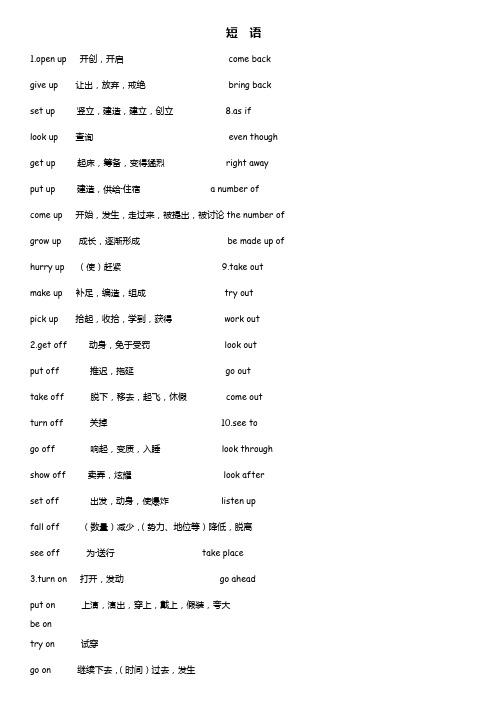
短语1.open up 开创,开启come back give up 让出,放弃,戒绝bring back set up 竖立,建造,建立,创立8.as iflook up 查询even though get up 起床,筹备,变得猛烈right away put up 建造,供给···住宿 a number of come up 开始,发生,走过来,被提出,被讨论the number of grow up 成长,逐渐形成be made up of hurry up (使)赶紧9.take out make up 补足,编造,组成try outpick up 拾起,收拾,学到,获得work out2.get off 动身,免于受罚look output off 推迟,拖延go outtake off 脱下,移去,起飞,休假come out turn off 关掉10.see togo off 响起,变质,入睡look through show off 卖弄,炫耀look afterset off 出发,动身,使爆炸listen upfall off (数量)减少,(势力、地位等)降低,脱离see off 为···送行take place3.turn on 打开,发动go aheadput on 上演,演出,穿上,戴上,假装,夸大be ontry on 试穿go on 继续下去,(时间)过去,发生live on 靠···生活,以···为食call on 拜访,号召,请求come on 跟着来,进展,逐渐开始,上演4.after all 毕竟,终究,到底not at all 一点也不,不客气,没关系in all 总共above all 首先,尤其是,最重要的是all over 全部结束,浑身,到处all right 安全的,(健康)良好的,正确的,好,行,可以first of all 第一,首先5.how ofenhow soonhow farhow longhow tall6.give awayput awaythrow awaytake awayrun awayfar awaygo away7.give backget back。
英语部分单词
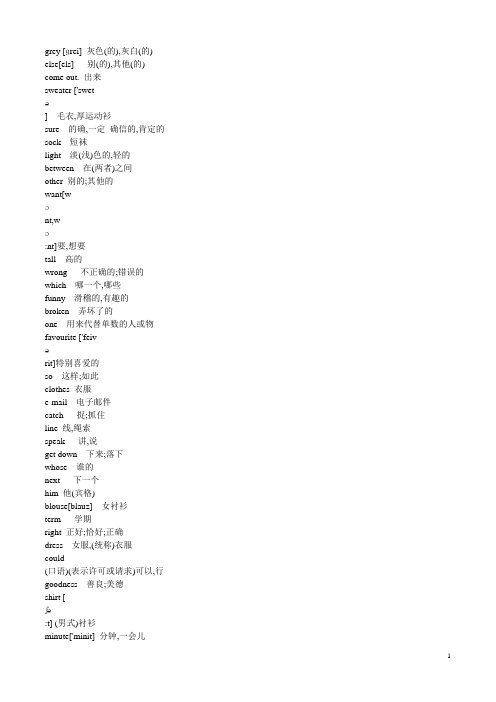
grey [ɡrei] 灰色(的),灰白(的) else[els] 别(的),其他(的) come out. 出来sweater ['swetə] 毛衣,厚运动衫sure 的确,一定确信的,肯定的sock 短袜light 淡(浅)色的,轻的between 在(两者)之间other 别的;其他的want[wɔnt,wɔ:nt]要,想要tall 高的wrong 不正确的;错误的which 哪一个,哪些funny 滑稽的,有趣的broken 弄坏了的one 用来代替单数的人或物favourite ['feivərit]特别喜爱的so 这样;如此clothes 衣服e-mail 电子邮件catch 捉;抓住line 线,绳索speak 讲,说get down 下来;落下whose 谁的next 下一个him 他(宾格)blouse[blauz] 女衬衫term 学期right 正好;恰好;正确dress 女服,(统称)衣服could(口语)(表示许可或请求)可以,行goodness 善良;美德shirt [ʃə:t] (男式)衬衫minute['minit] 分钟,一会儿plane 飞机trousers['trauzəz] 裤子Tuesday 星期二with 对....;关于skirt [skə:t] 女裙February n 二月mend 修补;修理dark 深(浓)色的,黑暗的eighteenth 第十八knife[naif](knives) 小刀yours 你的,你们的listen 听robot 机器人mine 我的careful 小心的;仔细的body 身体hers 她的carefully 小心地;仔细地broke(动词break的过去时)折断;打破put on 穿上(衣服等),戴上(帽子等) draw [drɔ:] 画;绘制lost 丢失的;丢去的theirs 他们(她们,它们)的has (动词have的单数第三人称)有tell 告诉;讲述ours 我们的face 脸;面孔round 球形的圆的glove [ɡlʌv] 手套eye 眼睛mummy (口语)妈妈about 关于,对于ear [iə] 耳朵pleasure['pleʒə] 愉快;高兴What about.?(询问消息,)怎么样? leg 腿food 食物beside [bi'said] 在...旁边hand 手drink 饮料喝watch 手表观看,注视long 长的hungry 饥饿的give 给short 短的;矮的thirsty ['θə:sti] 口渴的time 时间mouth 嘴water 水;浇水。
典范英语 3a部分
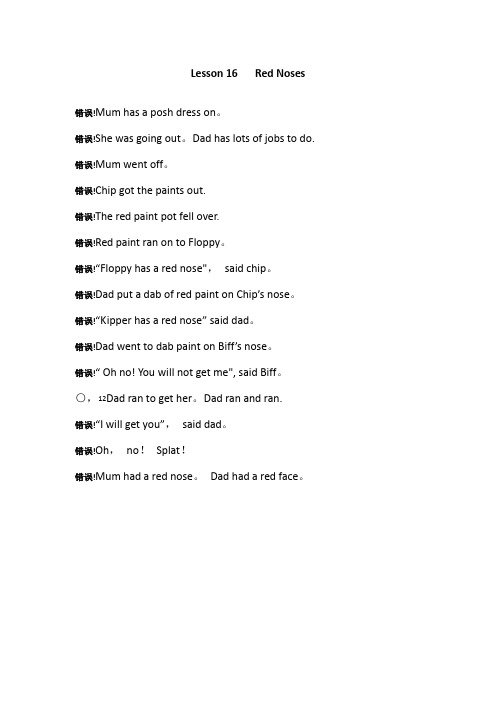
Lesson 16 Red Noses错误!Mum has a posh dress on。
错误!She was going out。
Dad has lots of jobs to do. 错误!Mum went off。
错误!Chip got the paints out.错误!The red paint pot fell over.错误!Red paint ran on to Floppy。
错误!“Floppy has a red nose",said chip。
错误!Dad put a dab of red paint on Chip’s nose。
错误!“Kipper has a red nose” said dad。
错误!Dad went to dab paint on Biff’s nose。
错误!“ Oh no! You will not get me", said Biff。
○,12Dad ran to get her。
Dad ran and ran.错误!“I will get you”,said dad。
错误!Oh,no!Splat!错误!Mum had a red nose。
Dad had a red face。
Lesson 17 The Ball Pit○,1Kipper and Anna went in the ball pit。
错误!“I am a batman,” said Kipper.错误!He fell into the ball pit。
错误!Then Anna fell into the pit。
○5But her glasses fell off。
错误!“Oh,no!,” said Anna,“my glasses!" “I can not find them,”said Kipper.错误!Anna was upset。
“Get out of the ball pit," said Kipper.错误!They all got out。
第一部分英语-中国·广州
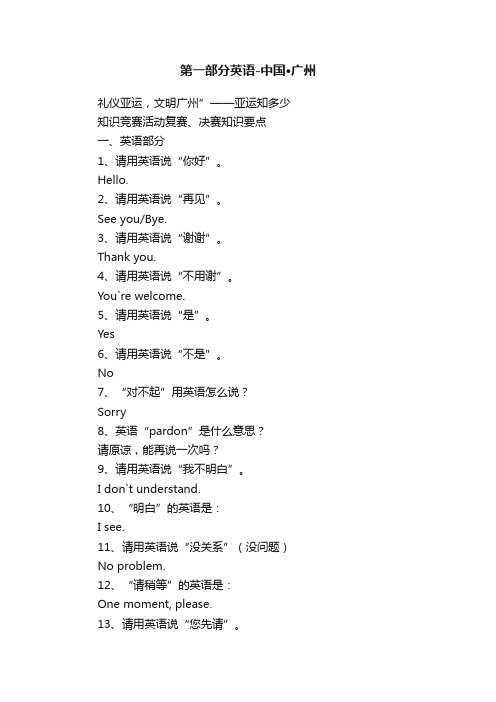
第一部分英语-中国·广州礼仪亚运,文明广州”——亚运知多少知识竞赛活动复赛、决赛知识要点一、英语部分1、请用英语说“你好”。
Hello.2、请用英语说“再见”。
See you/Bye.3、请用英语说“谢谢”。
Thank you.4、请用英语说“不用谢”。
You`re welcome.5、请用英语说“是”。
Yes6、请用英语说“不是”。
No7、“对不起”用英语怎么说?Sorry8、英语“pardon”是什么意思?请原谅,能再说一次吗?9、请用英语说“我不明白”。
I don`t understand.10、“明白”的英语是:I see.11、请用英语说“没关系”(没问题)No problem.12、“请稍等”的英语是:One moment, please.13、请用英语说“您先请”。
After you.14、“需要帮忙吗?”用英语怎么说?Can I help you?15、英语“Excuse me.”是什么意思?请问、劳驾、抱歉、借过……16、请用英语说“早上好”。
Good morning.17、请用英语从一数到十。
One、two、three、four、five、six、seven、eight、nine、ten18、请用英语说“很高兴认识你”。
Nice to meet you.19、请用英语介绍你的名字。
My name is……20、“请问你叫什么名字?”用英语怎么说?May I ask your name?22、问候语“你好吗?”用英语怎么说?How are you?23、英语“Fine, Thank you.”是什么意思?很好,谢谢。
24、请用英语说“祝你在这里过得愉快!”Hope you enjoy your stay here!25、“Have a nice day!”一般在什么时候说?告别时26、英语“Have you ever been to Guangzhou before?”是什么意思?你以前来过广州吗?27、请用英语说“很高兴来到这里”。
- 1、下载文档前请自行甄别文档内容的完整性,平台不提供额外的编辑、内容补充、找答案等附加服务。
- 2、"仅部分预览"的文档,不可在线预览部分如存在完整性等问题,可反馈申请退款(可完整预览的文档不适用该条件!)。
- 3、如文档侵犯您的权益,请联系客服反馈,我们会尽快为您处理(人工客服工作时间:9:00-18:30)。
工行:阅读理解The establishment of the Third Reich influenced events in American history by starting a chain of events which culminated in war between Germany and the United States. The complete destruction of democracy, the persecution of Jews, the war on religion, the cruelty and barbarism of the Nazis, and especially the plans of Germany and her allies, Italy and Japan, for world conquest caused great indignation in this country and brought on fear of another world war. While speaking out against Hitler's atrocities, the American people generally favored isolationist policies and neutrality. The Neutrality Acts of 1935 and 1936 prohibited trade with any belligerents or loans to them. In 1937, the President was empowered to declare an arms embargo in wars between nations at his discretion.American opinion began to change somewhat after President Roosevelt's "quarantine the aggressor" speech at Chicago (1937) in which he severely criticized Hitler's policies. Germany's seizure of Austria and the Munich Pact for the partition of Czechoslovakia (1938) also aroused the American people. The conquest of Czechoslovakia in March, 1939, was another rude awakening to the menace of the Third Reich. In August,1939, came the shock of the Nazi-Soviet Pact and in September the attack on Poland and the outbreak of European war. The United States attempted to maintain neutrality in spite of sympathy for the democracies arrayed against the Third Reich. The Neutrality Act of 1939 repealed the arms embargo and permitted "cash and carry" exports of arms to belligerent nations. A strong national defense program was begun. A draft act was passed (1940) to strengthen the military services. A Lend Act (1941) authorized the President to sell, exchange, or lend materials to any country deemed necessary by him for the defense of the United States. Help was given to Britain by exchanging certain overage destroyers for the right to establish American bases in British territory in the Western Hemisphere. In August, 1940, President Roosevelt and Prime Minister Churchill met and issued the Atlantic Charter, which proclaimed the kind of a world which should be established after the war. In December, 1941, Japan launched the unprovoked attack on the United States at Pearl Harbor. Immediately thereafter, Germany declared war on the United States.1. One item occurring before 1937 that the author does not mention in his list of actions that alienated the American public was ______.A. the burning of the ReichstagB. German plans for world conquestC. Nazi barbarismD. the persecution of religious groups2. The Lend-Lease Act was designed to ______.A. help the BritishB. strengthen the national defense of the United StatesC. promote the Atlantic CharterD. avenge Pearl Harbor3. The American Policy during the years 1935--1936 may be described as being ______.A. watchfulB. isolationistC. peacefulD. indifferent4. The Neutrality Act of 1939 ______.A. permitted the selling of arms to belligerent nationsB. antagonized JapanC. permitted the British to trade only with the AlliesD. led to the Lend-Lease Act5. The United States entered the war against Germany ______.A. because Germany declared warB. because Japan was an ally of GermanyC. after Germany had signed the Nazi-Soviet PactD. after peaceful efforts had failed单项选择6. Why did you get up so early in this morning.A. WhyB. getC. soD. in7. She called on the workers to fight against their rights.A. calledB. onC. toD. against8. Can you tell the difference among A and B?A. tellB. theC. differenceD. among9. To know what is good and doing what is right are two different things.A. andB. doingC. areD. different10. Miss Green saw the robbery and she reported it to the police.A. robberyB. sheC. itD. To阅读理解1.A[解析] 由第一段的“The complete destruction of democracy, the persecution of Jews, the war on religion, the cruelty and barbarism of the Nazis, and especially the plans of Germany and her allies, Italy and Japan, for world conquest caused great indignation in this country and brought on fear of another world war. ”可推知B、C、D项都在文中提到了,故本题正确答案为A。
2.B[解析] 由第二段的“A Lend Act (1941) authorized the President to sell, exchange, or lend materials to any country deemed necessary by him for the defense of the United States.”可推知B项“加强美国国防”是正确的。
3.B[解析] 由第一段的“While speaking out against Hitler's atrocities, the American people generally favored isolationist policies and neutrality. The Neutrality Acts of 1935 and 1936 prohibited trade with any belligerents or loans to them. ”可推出答案为B项,“孤立主义的”。
